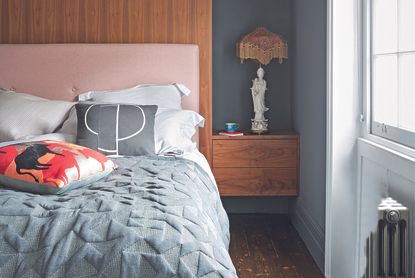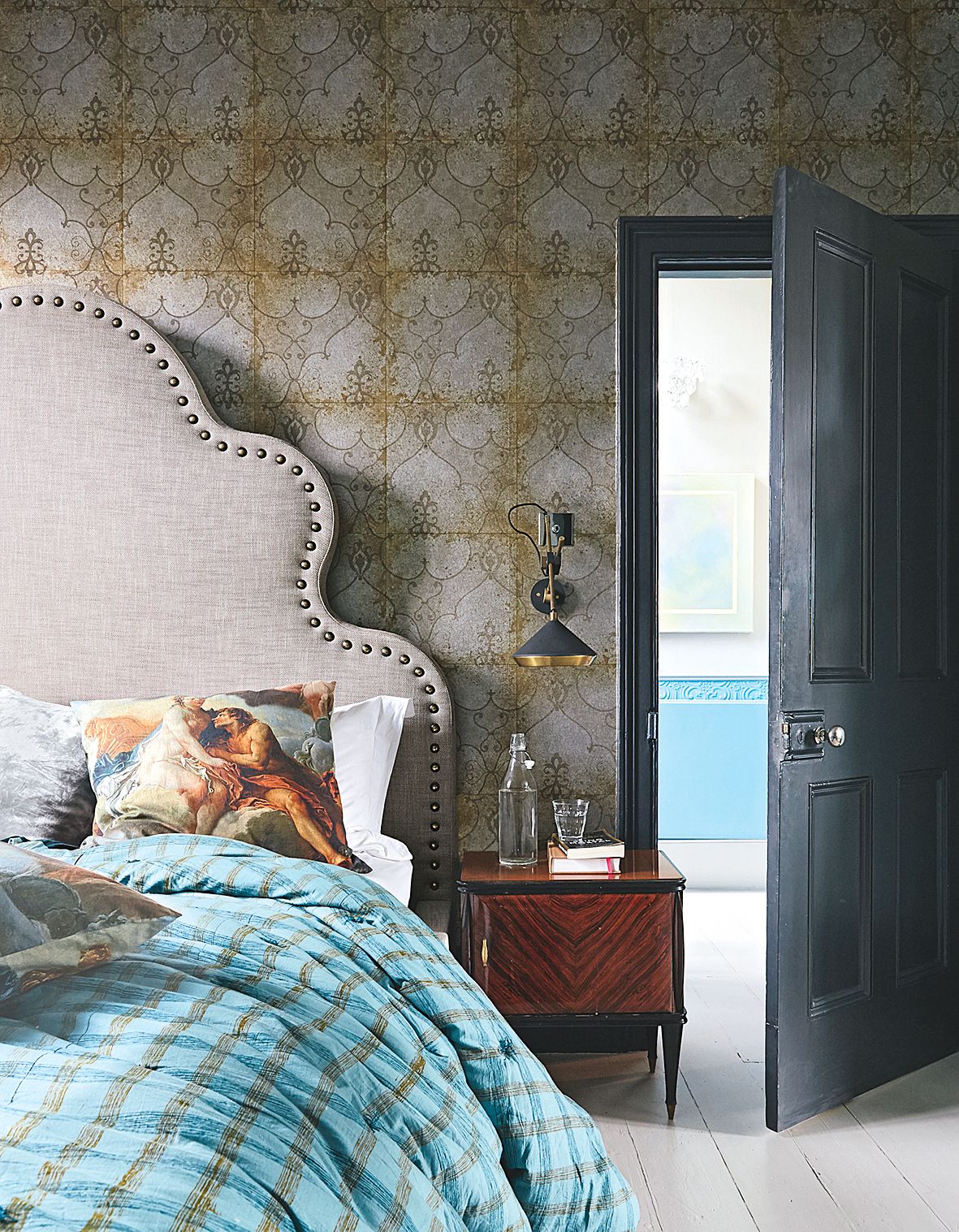How to sleep better - interior design experts explain the small changes that make a big difference
How to sleep better by the experts who understand that your surroundings and decor can have a big effect

Worrying about how to sleep better is a very modern preoccupation. When a group of American sleep scientists studied African and South American hunter-gatherers in 2015, they discovered that these tribes didn’t experience anything like our levels of insomnia. Insomnia, they concluded, is a function of Western lifestyle. “Modern society is not conducive to sleep,” concurs Prof Guy Leschziner, consultant neurologist at Guy’s and St Thomas’s Hospital in London and author of The Nocturnal Brain. “A racing or worrying mind is not good for sleep - nor is a bright computer screen, surfing the internet or social media.”
Assuming we don’t want to return to cave life or - heaven forbid - relinquish our devices, what bedroom ideas can we utilize to optimise sleep? Sleeplessness is a common problem: one-third of British people suffer from insomnia, and even more have off-nights here and there. Fortunately, scientific progress means we’re no longer in the dark about how to improve matters.
For starters, those fabled eight hours a night needn’t be the goal. “Somewhere between seven and eight and a half hours is considered optimal,” Leschziner explains. “There is good evidence that regularly getting fewer than seven hours or more than nine isn’t good for you”. (Consequences can include heart disease, obesity, Alzheimer's and depression.) But one size doesn't fit all, and variation depends on age and genetics. So how much sleep do you actually need? Check in with how you’re feeling, says Lisa Artis, sleep adviser for the Sleep Charity. “If your day is still a slog by lunchtime and you find yourself turning to junk food and caffeine to get you through, then you’re not getting enough.”
How to sleep better

As soon as you rise, let in the light
Prepping for a good night’s sleep should start the minute you wake up. Experts agree we should rise at the same time daily, even at weekends - this should be matched to our chronotype (ie, whether you’re a lark or a night owl), and any more than an hour’s deviation either side will confuse your circadian rhythm. As soon as you rise, let in the daylight: “Bright light helps people wake up more quickly,” Leschziner says. “It’s probably the strongest driver of our circadian rhythm.” It’s why you’ll also want blackout blinds or think carefully about your bedroom curtain ideas, to avoid light exposure at the wrong time of day.

Muted tones are more restful
In fact, it’s a good opportunity to rethink bedroom design. “That doesn’t mean you need to have a pale color scheme,” Artis says. Strong, indulgent colors can work: “You just don’t want it too bold - muted tones are more restful.” Grey bedroom ideas tend to be the most failsafe. Artis also recommends decluttering the bedroom: “It’s about creating a space that is serene and calm.”
Bedlinen, meanwhile, should be made from natural fibres, so that they wick away sweat, though neither feather or synthetic pillows and duvets seem to have the edge - that can be down to personal preference - though you'll need one of the best mattresses in order to start your sleep off right.

Good sleep hygiene requires a holistic approach throughout the day, and should include both physical and mental exertion. “Exercise promotes both the quality and quantity of sleep,” Artis explains. “It tires the body out, it relieves stress and is good for mental health.” But she advises against intense, adrenaline-boosting exercise within two hours of bedtime. Unsurprisimgly, caffeine and alcohol are widely regarded as the greatest sleep saboteurs - well, except by those who can sink a bedtime espresso. Dr Hugh Selsick, who founded the NHS’s first sleeplessness centre, The Insomnia Clinic at Royal London Hospital for Integrated Medicine, recommends avoiding caffeine after 2pm, and alcohol in the evenings, or altogether if possible. Most people’s sleep will be more fragmented after alcohol; it also tends to reduce that deep, restorative sleep.
If the burgeoning sleep industry is to be believed, our sleep woes could be easily fixed by investing in, say, expensive weighted blankets, supplements and even hooded pillows. Proceed with caution, Leschziner warns: “There are a lot of people with sleep problems, and a lot of people exploiting that.” For starters, ditch the sleep tracker, he advises: “Their accuracy is dubious, especially if you have sleep issues.” And if a sleep tracker is saying you've slept terribly, “that’s probably going to give you a worse night's sleep,” he adds. “I’ve seen people descend into a spiral of anxiety, depression and worsening insomnia because the tracker is telling them they're only getting an hour of dreaming sleep.”
In fact, anxiety is sleep’s worst enemy. If you worry about the amount of sleep you’re getting, and your sleep hygiene is already squeaky clean, spare yourself the gimmicks and consider CBTi, or cognitive behavioural technique for insomnia. Widely regarded as the gold standard treatment, it was brought to Britain by Selsick and is now available in a handful of NHS clinics (so far, East Grinstead, Guildford and Newcastle) and via the Sleepio app (£3.85 a week). With efficacy rates at about 70-80%, it works by removing the negative associations of the bedroom - ie, that it’s a place for tossing and turning, but also working, watching TV, doom scrolling, paying bills, arguing etc - and replaces them with new, positive connections (in CBTi, the bedroom is only for sleeping and sex). Eventually, your body recognises that when in bed, its only job is to sleep. The five-week programme has no set bedtime - you only go to bed when you can’t keep your eyes open anymore: “This gives you a much better chance of falling asleep and not being exposed to anxieties around sleeplessness,” Selsick explains. There is, however, a set rising time, which ensures that you begin to feel tired at the same time every night.
If you believe you have insomnia, don’t delay in getting to a doctor - it may also be that you have a (very treatable) sleep disorder (apnoea, restless leg syndrome, etc). There’s one sleep disorder, however, that many of us perhaps subscribe to: Revenge Bedtime Procrastination, ie, we resist bed because we haven’t had enough leisure time in our busy day - it’s a classic symptom of modern life. If you want to sleep better, Leschziner’s key tip is to “recognise the fact that sleep is important and if you have the choice to sleep when you can, prioritise it”.
How can I sleep better at night naturally?
There are some easy ways to sleep better naturally, advises Dr Allie Hare, Secretary of the British Sleep Society, and a consultant in sleep and respiratory medicine at the Royal Brompton Hospital London. The best approach, she says, is to have a healthy, balanced diet “with plenty of vegetables, some fruits, protein and slow-release carbs, so that blood sugars are stable”. Avoid big, heavy meals a couple of hours before bedtime, she adds, as reflux or indigestion can cause sleep disturbances.
How can I improve my sleep?
- Start the day off by opening the curtains the moment you wake up
- Choose muted tones for your bedroom
- Make your bed using bedlinen made from natural fibers
- Get some exercise during the day
- Don't give yourself anxiety by worrying about sleep trackers
- Go to bed when only you can no longer keep your eyes open
Be The First To Know
The Livingetc newsletter is your shortcut to the now and the next in home design. Subscribe today to receive a stunning free 200-page book of the best homes from around the world.
Fleur Britten is a well-respected journalist who for years was the Senior Features Editor at Sunday Times Style. She is known as one of the smartest lifestyle journalists around, revered for being able to decode trends and report on new zeitgeists as they happen. She now writes for the Telegraph, Livingetc, Vogue, The Times, Harper's Bazaar and the Guardian.
-
 How to Thaw a Frozen Pipe — Learn Everything You Need to Know in 5 Minutes With This Guide
How to Thaw a Frozen Pipe — Learn Everything You Need to Know in 5 Minutes With This GuideWinter storm caught you off guard? We asked an expert — just how do you thaw a frozen pipe?
By Hugh Metcalf Published
-
 The 12 Very Best Silk Bedding Pieces — As Our Style Editor Says: 'It's What Dreams Are Made Of!'
The 12 Very Best Silk Bedding Pieces — As Our Style Editor Says: 'It's What Dreams Are Made Of!'Slumber in lustrous luxury with the very best silk bedding sheets, duvets, pillowcases, and more — your sleep score will thank us later
By Julia Demer Published

